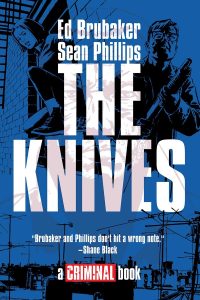 The Knives
The Knives
Writer: Ed Brubaker
Artist: Sean Phillips
Colorist: Jacob Phillips
Publisher: Image Comics
Publication Date: August 2025
After the release of Houses of the Unholy, Ed Brubaker and Sean Phillips returned to the Criminal universe in the form of Amazon’s Criminal TV series. That adaptation is currently filming with no release date revealed, but the process of pre-production and casting led to nearly a year of radio silence from Brubaker and his newsletter. As the show began to take shape, Image finally revealed that the show wasn’t the only thing being worked on during this long quiet stretch, as the creative duo was also returning to Criminal with their latest OGN, The Knives.
The Knives follows three familiar faces in the Criminal universe: Jacob Kurtz, the creator of the “Frank Kafka PI” comic strip; Angie, introduced all the way back in the first Criminal arc “Coward” and raised by the bartender of the Undertow, Gnarly; and Tracy Lawless, who previously had run-ins with the Hyde family criminal organization because of his father, Teeg and brother, Ricky. Of these three characters, The Knives is primarily focused on Jacob and Angie as the book alternates chapters telling their two very different but converging stories. Like Cruel Summer, there’s more structural ambition here to be a unique epic that sets up the next era of Criminal, and revives familiar themes of being defined by your mistakes and your family history.
Half of this book, the part that serves as a Hollywood confessional and satirizes Brubaker’s experiences as a writer outside of comics, is serviceable and occasionally a good bit of fun. However, the joy is short lived as we’re treated to Brubaker and Phillips abandoning experimentation in their last few books in favor of doing more of the same. What works about The Knives is what has always worked about Criminal, and what doesn’t work is equally not a surprise within this saga or for this duo.
At its best, The Knives has a sense of chilling self-awareness about its own enterprise: returning to something we thought was over, seeing it take on a new life and feeling yourself at a remove from moments of real consequence as the forces of the world around you push you forward rather than your own choices. The first chapter follows Jacob Kurtz as he makes his way to Hollywood for the filming of a TV adaptation of “Frank Kafka, PI.” Much of the plot that follows feels heavily inspired by The Sopranos episode “D-Girl” where Chris travels to Hollywood to assist Jon Favreau in making a mob film. Hijinks ensue, romantic encounters occur, and it’s all washed away with a bitter aftertaste of nihilism and crushed dreams.
This opening is taken from Brubaker’s own experiences of trying to make it in Hollywood, writing for several TV projects and circling adaptations of his and Sean Philips’ work for the last two decades. In these sections, The Knives comes alive as a commentary on the whole enterprise of Criminal and the expectations of a Brubaker/Phillips work. Existential influences are tossed aside by execs and actors who don’t know Kafka, the fun of their world is reduced down to formulaic genre conventions, and the medium of comics ends up being treated not even like storyboards for an adaptation, but more insultingly like a cumbersome pitch deck.
One of my favorite bits in the whole book is when someone refers to Jacob’s strips as a “graphic novel,” to his utter confusion about conflating the two formats. I’ve often said anyone in Hollywood who claims they’ve read the comics they’re adapting is usually lying, and you can almost always tell because they’ll say “the comic books” or “graphic novels” instead of “comics,” “issues,” “trades,” “strips,” or whatever would actually be appropriate for the material. It’s a small thing, but you can’t unsee it after you notice. That attention to detail, or lack thereof, that level of dismissiveness towards the medium emanates from the Hollywood side of this story and leads to all the best elements of The Knives.
Jacob’s journey to preserve the identity of his work and being caught up in the Sisyphean elements of the Criminal world starts to form the backbone of a strong self-critique of Brubaker and Phillips’ own comics. Oftentimes you hear comics writers complain about the Hollywood life, about writers rooms and about pitches going nowhere, or movies being green lit only for the plug to be pulled at the last second. And yet they keep going back to the well with the hopes that something different will happen this time. Similarly, you hear stories all the time of page rates plummeting, or comics being an unstable livelihood, or the predatory nature of publishers. And yet people keep trying to make comics. Criminal is, at bottom, the story of people in a bad place who never seem to lose the hope of escaping into a different, better world. As brutal as some of the protagonists can be, as cynical as some of the stories feel, there’s always a fantasy or a dream of a different life that causes an infinite cycle of self discovery, only to end in failure. Transposing all that frustration into the creative industry is immediately compelling and gives this book a very different feel early on.
You think the mob is bad? Try going to Hollywood.
Indeed, there’s quite a bit of precedent here for that connection as well. The early history of Hollywood and comics, DC in particular, is littered with tales of the mob upholding studios, wrangling in creatives, and suppressing union and organizing efforts. It’s a fascinating connection and one where Brubaker’s subtext often feels just like text. Who do you want to find yourself locked in a room with: Dan, the man who will steal all your hopes and dreams, or Brandon Hyde who might rough you up and also steal all your hopes and dreams? Depending on whether you’re Jacob or Angie, it almost doesn’t make a difference.
If the whole book was simply this charmingly self-aware journey into the belly of the corporate beast, then it might be one of the best Criminal stories thus far. Unfortunately, it very quickly trades out its savvy satire for a more generic, tired crime story. Angie’s half of the alternating stories is the most ripe with drama and proper emotional weight, as she drifts through life without the Undertow or Gnarly to ground her. But the immediate problem is that while we’re reading about two different characters, the storytelling doesn’t allow for much juxtaposition of style or structure. The entirety of The Knives is told in third person, and while there are parallels to the life Angie is seeking and the life that Jacob has, there isn’t any attempt to ground that part of the story in the formal elements of the comic.
Ed Brubaker has never been a formalist, which makes sense since his inspirations are in classical detective and adventure novels that make use of more simple story structures and prose that build up into massive narrative explosions. To his credit this style has worked for several years, most recently the Reckless series which are some of my favorite graphic novels of all time. But the trouble with the way The Knives is organized is that it calls attention to that very structure, intentionally or not. We open with a story about storytelling, we overtly shift perspectives chapter to chapter, we set up two characters who collide after living comedically different lives. Yet none of that feels reflected in the prose. It’s a similar problem to Where the Body Was. At some point, you write yourself into situations where your craft either needs to match the material you’re going for or you’re forced to change the material. Brubaker does neither and just allows the style to stay the same even if it’s not serving the story anymore.
The other problem is that The Knives doesn’t function as its own entity like every other Criminal book has, but rather as a setup for more Criminal later. It ends up embodying the commercial compromises for the sake of content that it so well skewers in the opening by treating its world and characters like a continuous content farm to make more adventures, absent the cathartic and self-contained stakes that made each volume of the series so engaging. I love Jacob’s struggle against Dan and the Hollywood machine after they turn his existential comic strip into just another cop show. But by the end, that’s exactly what happens to Jacob, Angie and Tracy. What is The Knives if not just another crime comic? It doesn’t feel like a story being told for its own sake, for its own reasons and ambitions, instead it’s just more Criminal to synergize with more upcoming Criminal. The joy of Criminal has always been that you could start reading it from anywhere, but The Knives assumes a certain level of investment. Even if you go in blind and grow to like Jacob, Tracy and Angie, the book just stops rather than ends, with a message that there will be more, succumbing to the very logic that we thought the book was making fun of.
For his part, Sean Phillips has perfected the art of rough and tumble characters, with an art deco flair that radiates from both his line work and is enhanced by the moody colors of Jacob Phillips. Stylistically, The Knives is at home with the California Noir quality of so much of Brubaker and Phillips’ past work, but again this is as much praise as it is criticism. There isn’t anything new here, there isn’t anything that’s subpar either. It’s what you’ve come to expect and not a drop more or less. One major positive in the latest phase of Brubaker and Phillips’ career is that Jacob Phillips brings out some of the best in Sean Phillips’ art. While Sean Phillips has been colored by some of the best, the quality and shared aesthetic sensibilities of the father-son duo make for a much more consistently complimentary style.
The Knives is charming more often than not, weaving together an entertaining story with familiar characters and archetypes. It’s a comic that goes down smooth at the end of a long week, the kind Brubaker and Phillips have excelled at for years. But it’s also nothing new, and every opportunity the book gets to flirt with innovation it ends up ignoring to its detriment. As much fun as Criminal has been over the years, it’s difficult for me not to read this story as an admission of defeat, that this sets up the very kind of stories that Jacob himself appeared to be fighting against. If the goal of this comics partnership is constant output, they’ve certainly achieved that. But if the goal is to grow as artists with new challenges and new ideas, The Knives has abandoned that entirely.
The Knives is out this month via Image Comics
Read more great reviews from The Beat!


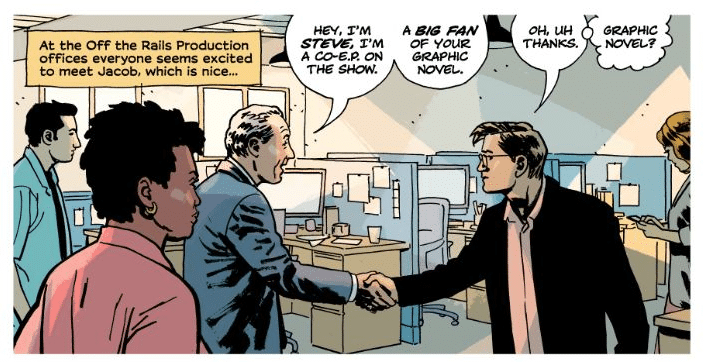
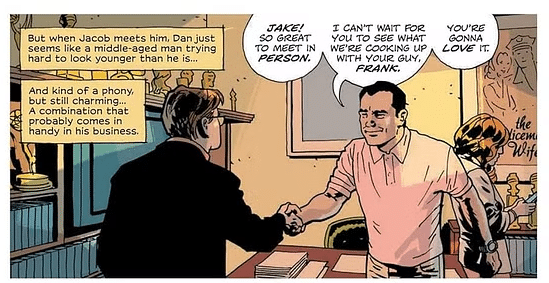
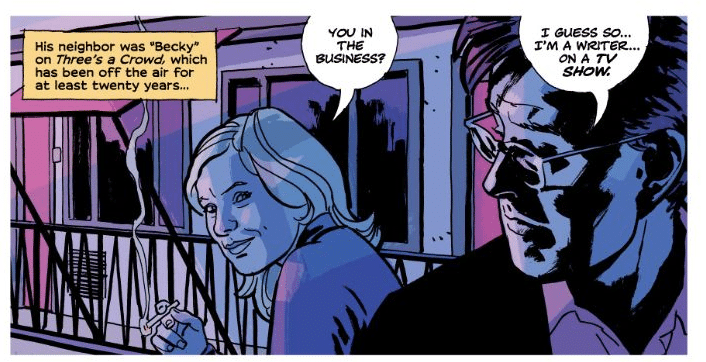



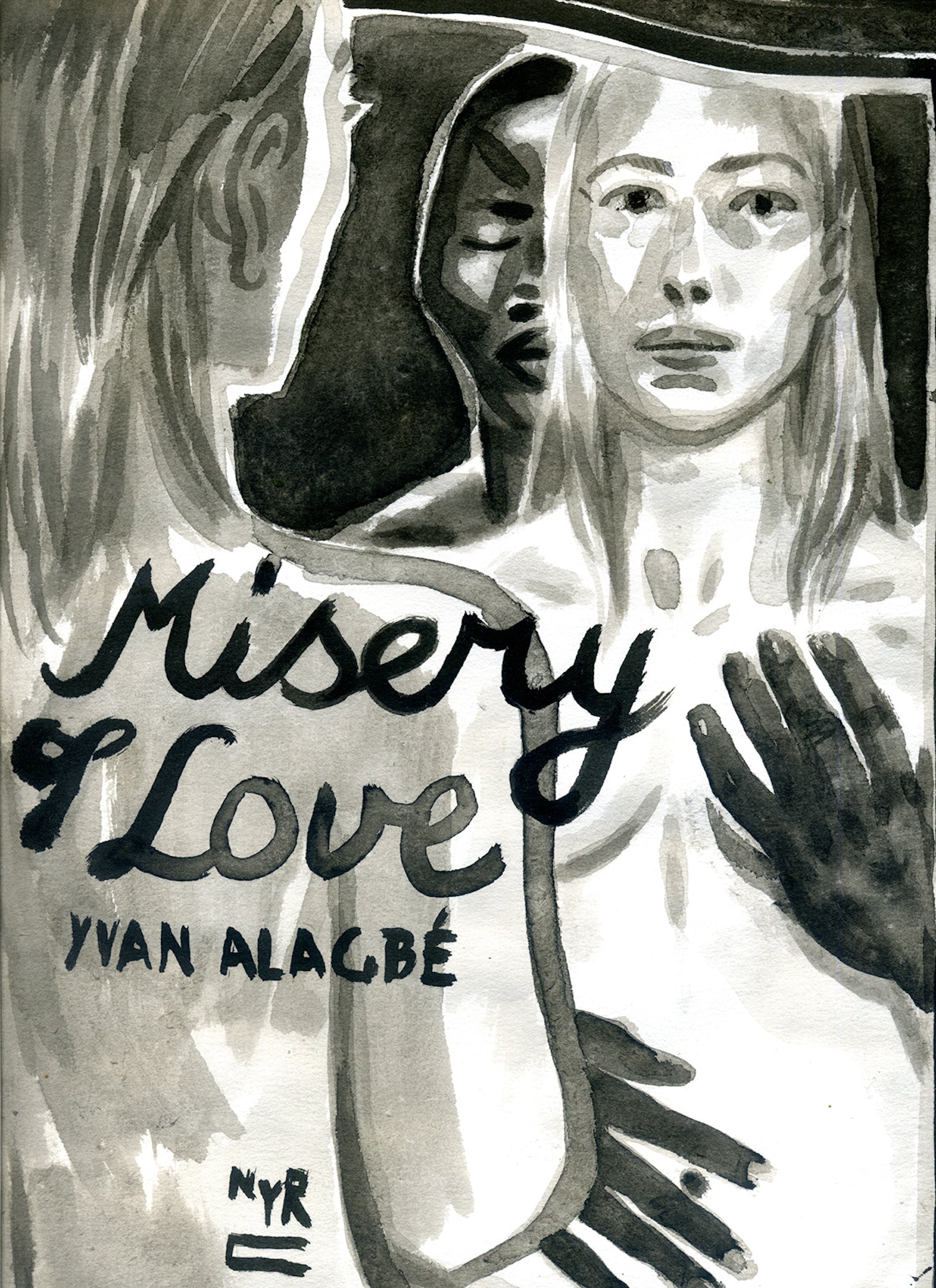

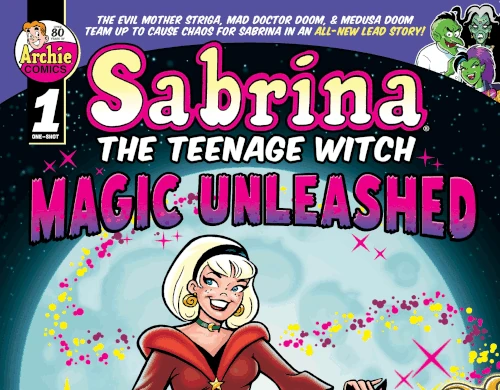



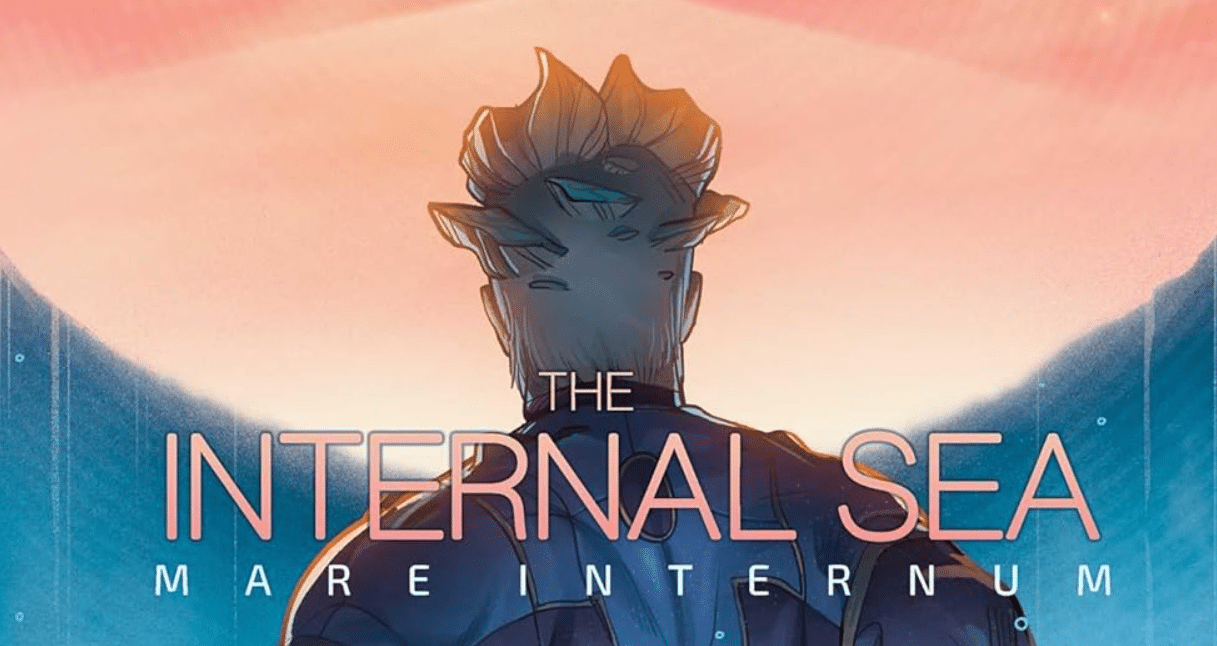





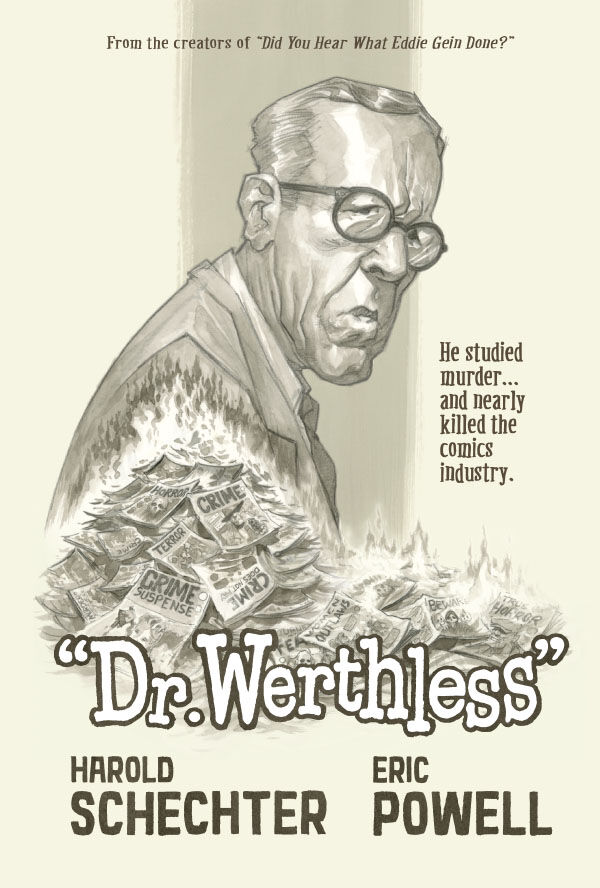


 English (US) ·
English (US) ·